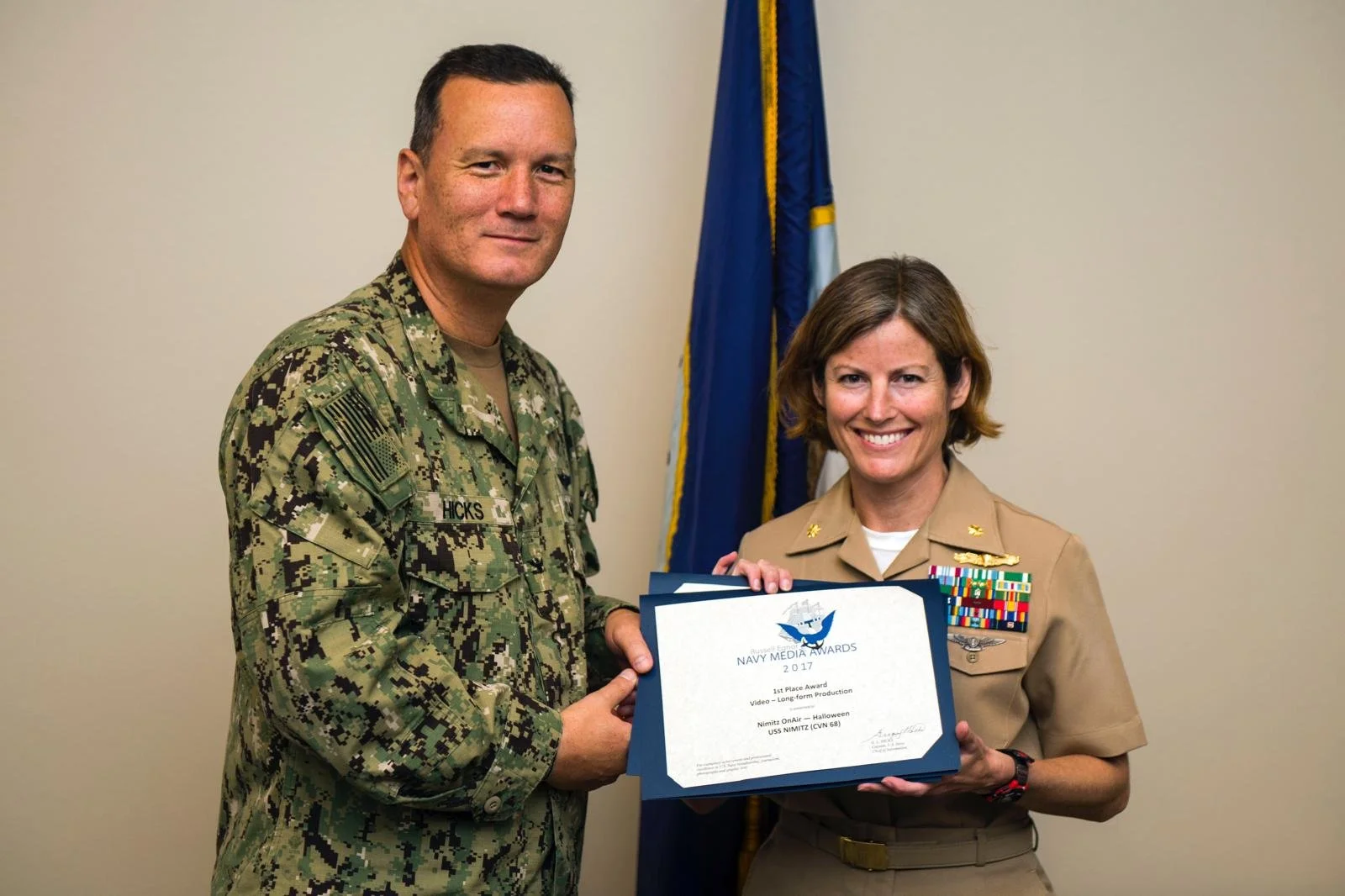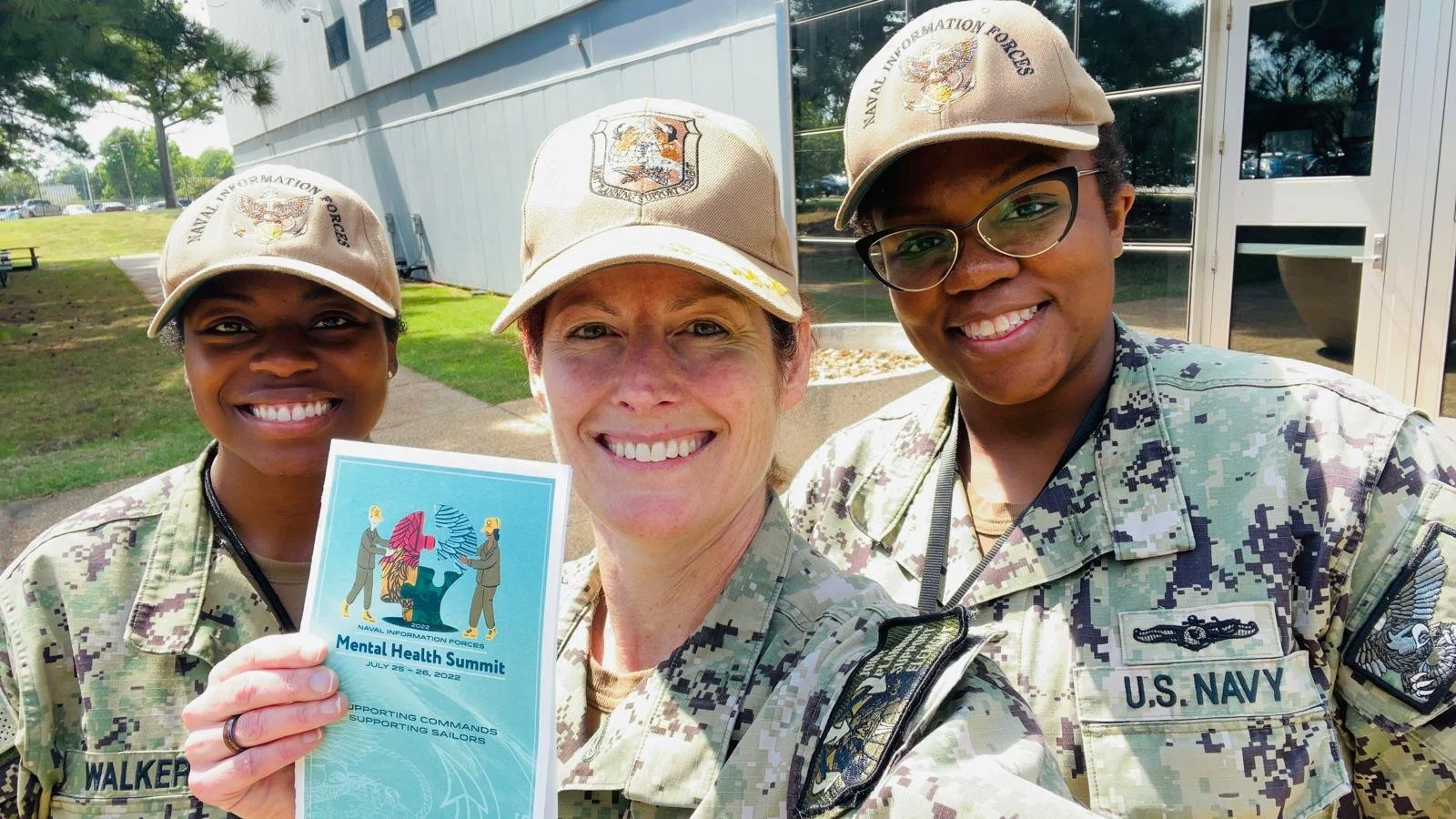An Open Letter to the Navy Public Affairs Community
A proud moment in 2017 when USS Nimitz took home mutiple communication awards. As their department head, I was so proud of the team.
Professional Discourse
To my fellow Public Affairs professionals—current and former, active duty and civilian:
We need to talk. Not in hushed tones behind closed doors, not in carefully coded conversations over coffee, but openly and honestly about the culture of fear that has taken root in our community. A culture that undermines everything we claim to stand for as professional communicators.
For the last five years of my naval career, I felt unsafe in my own profession. Not because of external threats, but because of persistent harassment, implicit threats to my career, and exclusion from the very community that parades itself as a beacon of truth and transparency.
The Unspoken Truth
Ask yourself: When was the last time you saw an active-duty PAO publish a policy critique in any form of media?
I know the answer: Never.
Despite the Department of Defense's stated commitment to truth and transparency, an unacknowledged yet deeply entrenched vein runs through our culture—one that discourages transparency, suppresses professional dialogue, and punishes those who dare to speak openly about policy decisions.
The consequences for speaking up are swift and severe. I know because I experienced them firsthand.
My Story
On January 29, 2024, while still serving as an active-duty Public Affairs Officer, I posted a respectful video on my civilian LinkedIn account. In it, I criticized the Navy's decision to eliminate the requirement for a G.E.D. or high school diploma for enlistment. I shared my own journey of overcoming adversity to earn my diploma, hoping to contextualize my concerns and spark professional dialogue about maintaining force standards.
Instead of discussion, I got retaliation.
Within hours, two senior Navy Public Affairs leaders responded—one with a sarcastic comment directly on LinkedIn that invited pile-on attacks from others. Capt. Jodie Cornell, a uniformed PAO serving as Public Affairs Chief at Personnel Command publicly belittled me, dismissing my concerns by stating I wasn't "in the room" when the decision was made. When I reached out to her privately on Instagram to explain my rationale, she told me to stay focused on my assigned duties and refrain from public commentary.
That same day, Dave Werner, a senior civilian from CHINFO called me directly. He reminded me of my duties as a Navy communicator to echo the Navy party line—or "find employment elsewhere."
Out of fear for my future, I removed the video.
A week later, my orders to Pensacola were rescinded without explanation. Only later was it implied by my head detailer that the Navy wanted someone "more bought in" to its recruiting policies.
Whatever it is, the way you tell your story online can make all the difference.
The Regulatory Straightjacket
This culture of silence is codified in Navy Public Affairs Regulations (5720.44C CH-1), which contains a telling contradiction. The regulation states that even when not in uniform or on duty, PAOs must "remain impartial and even disinterested in the development of social, political, and cultural issues." Yet in the same section, it claims this does not "abridge their individual rights under the First Amendment."
Which is it?
The answer, in practice, is clear: Professional silence is the only viable path for career survival. The regulation creates a chilling effect that extends far beyond official duties, turning our First Amendment rights into a hollow promise.
The Double Standard
Let's be honest about what we all observe: Discretion, as currently interpreted, is entirely subjective.
Those whose viewpoints align with current leadership priorities face no consequences—including the numerous active-duty PAOs who publicly opposed the new Administration's changes to DEI policies as they were rolled out earlier this year. But those who raise ethical concerns, even respectfully, are ostracized, blacklisted, and denied advancement.
I know this system intimately. After posting that video, I received two "less than stellar" evaluations in my nearly 30-year career—evaluations that, while worded positively, used the senior rater's numerical ranking to signal to advancement boards that I was not worthy of promotion. Protesting these markings means writing a statement that can be contradicted by your reporting senior, effectively giving them the final word. The game is rigged to promote only the most compliant officers.
Professional Exclusion
In April 2024, I was excluded from a key professional development event that many of my peers attended. When I inquired to CHINFO’s senior civilian Dave Werner, I was told it was reserved for those assuming greater leadership roles—a claim contradicted by the attendee list, one in particular who had a retirement request pending.
The message was clear: Silence is rewarded. Questioning the system is punished.
Even when participating in civilian advocacy on personal time, the double standard persisted. After speaking at a press conference in support of a DoD nominee—while on approved leave and in civilian attire—I received a formal Letter of Instruction for a minor procedural oversight. That letter's chilling effect shaped everything I said, posted, and discussed professionally until the day I retired.
Yet when transgender service members testified before Congress in 2019 advocating to serve openly, I'm unaware of any facing professional consequences.
The pattern is unmistakable: Speak in alignment with leadership preferences, and you're safe. Challenge policy decisions, and you're a target.
The Broader Implications
This is not the story of one disgruntled officer. This is an urgent call to examine a systemic failure that affects us all.
The Navy's 2022 "Get Real, Get Better" campaign was launched to improve performance, accountability, and culture by encouraging sailors and leaders to face problems honestly and fix them effectively. That program rings hollow when its own communicators are silenced for doing exactly that.
The DoD's Principles of Information state that "information will not be classified or otherwise withheld to protect the government from criticism or embarrassment." Yet those tasked with upholding that principle—those who see policies that may damage the Armed Forces—are the very ones being silenced.
What kind of institution punishes truth-tellers and promotes only the compliant?
This climate doesn't just discourage transparency—it actively disincentivizes ethical leadership. It rewards conformity over courage and leaves no space for the mavericks and reformers our institutions desperately need. How can we hope to improve, innovate, or rebuild trust if we drive out the very people willing to hold the system accountable?
A Call to Action
To my fellow PAOs, I challenge you to reflect:
When did we become so afraid of our own voices?
When did professional discourse become synonymous with disloyalty?
When did we accept that our role is merely to parrot talking points rather than engage in the kind of thoughtful communication that builds genuine trust and credibility?
These are the very core values we espouse in our public affairs principles of information. Two key tenets come to mind:
"A free flow of general and military information shall be made available, without censorship or propaganda, to the men and women of the Armed Forces and their dependents."
"Information will not be classified or otherwise withheld to protect the Government from criticism or embarrassment."
When and where did we lose our way?
We are trained communicators, strategic thinkers, and advisors. We understand the power of authentic messaging and the danger of hollow rhetoric. Yet we have allowed ourselves to be reduced to mere echo chambers, afraid to engage in the very kind of professional discourse that would make us better at our jobs and our institution stronger.
The Path Forward
Until we allow PAOs—and all service members—the professional respect and ethical space to voice concerns in good faith, our messaging will remain hollow, our morale fragile, and our credibility at risk.
We must distinguish between operational security and intellectual honesty, between discretion and censorship, between loyalty and blind obedience.
True loyalty to our institution means caring enough to help it improve, not remaining silent while it stumbles.
To Our Leaders
To the senior PAOs and civilian leaders who set the tone for our community: Your actions in response to professional dissent speak louder than any policy or regulation. When you silence thoughtful critique, you don't strengthen the institution—you weaken it. When you punish professional discourse, you don't demonstrate loyalty—you demonstrate fear of accountability.
Instead of punishing those who speak up, create safe spaces where professionals can voice issues of larger concern. Revise our public affairs regulations to encourage healthy debate instead of silencing it.
To My Peers
To those still serving: You have more power than you realize.
Professional discourse is not insubordination. Thoughtful critique is not disloyalty. Speaking truth to power is not career suicide—silence in the face of institutional failures is career surrender.
I chose to speak up and retired as an O5 with my career intact, later enjoying life as a podcaster and citizen activist. But had my ideas been embraced instead of silenced, I would have channeled this same passion for advocacy and positive change to make my professional community better.
We entered this profession to communicate truth, to build understanding, to serve as trusted advisors. We cannot fulfill that mission if we are too afraid to speak.
In Closing
Silence is not loyalty. It is fear.
And fear, left unchallenged, is the enemy of progress.
Our community can be better. Our institution can be stronger. But only if we find the courage to engage in the kind of honest, professional dialogue that our roles demand and our nation deserves.
The choice is ours: Continue the culture of fear, or reclaim our voices as professional communicators.
I know which path I'm choosing.
Respectfully submitted,
Theresa Carpenter
A Fellow Public Affairs Professional







